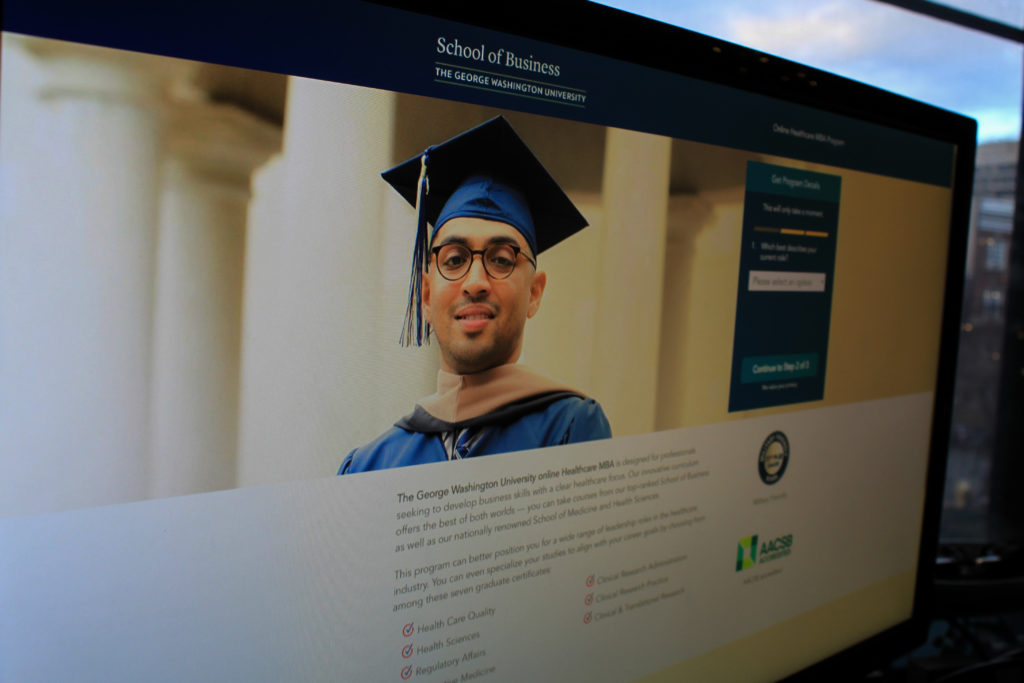Two of GW’s online graduate programs were ranked among the best in the country by U.S. News and World Report earlier this month.
The national media company that publishes college rankings annually placed the online graduate engineering program in the School of Engineering and Applied Science at No. 15 and the online master’s in business program in the School of Business at No. 22 nationally. Officials said the ranking is a result of faculty directly engaging with and listening to students to provide them with the academic support they need.
SEAS Dean John Lach said the replication of the school’s performance in an online environment is a “testament” to the programs’ design, faculty and support staff.
“The engineering school’s online programs reflect the aspects for which our on-campus programs are known: academic quality, technical depth with societal breadth and the personal attention we provide to students,” he said in an email.
Lach said he is confident the programs’ reputations will continue to improve in the future.
The rankings are based on nine separate categories factored into a final score. The engineering program received high marks in the student engagement category, placing 10th, and faculty rank and training, placing 11th.
Shahram Sarkani, the director of online programs in SEAS, said engineering school officials are “responsive” to students’ wishes to help them succeed, explaining the higher ranking.
“We give them one point of contact, and through that contact, we take care of them from the time they apply until the time they graduate,” he said in an email.
Sarkani said the online engineering programs all use similar approaches to in-person courses. Administrators hold online office hours daily so students can interact with faculty to promote student success, he said.
“As our program continues to grow, we hope that success will lead to a rise in the rankings,” Sarkani said.
Liesl Riddle, the associate dean for graduate programs in the business school, said the high rankings will help raise awareness of online programs and encourage faculty to develop “innovative” new online courses.
She said the rankings reflect some of the major successes in their programs overall, including “deep” student engagement, the “quality of the online classroom environment” and an emphasis on experiential learning.
The online MBA program ranked strongest in student engagement, at 26th overall out of 335 programs.
“The business school’s online courses are custom-crafted internally by the same faculty that teach our classroom courses and are supported by a state-of-the-art instructional design team and in-house studio,” Riddle said in an email.
She said the school’s D.C. location allows officials to virtually “bring into the online classroom” industry leaders and policymakers who appear in face-to-face classroom settings.
Riddle said officials will work to expand the number of graduate certificates online and “further develop” services available to students, like online advising, career services and online networking happy hours.
Business school Dean Anuj Mehrotra said last spring that officials planned to add more graduate certificates online, increasing the total by at least a dozen in the fall. The business school currently offers 24 graduate certificates.
Ayman El Tarabishy, the program director of the online healthcare MBA program and a teaching professor of management, said achieving desired rankings begins with setting a clear vision of what the members of a program want to accomplish and a strategy for accomplishing it.
El Tarabishy said the program has a three-part strategy for success: ensuring the program fits in the “portfolio” of the business school’s offerings, offering the course over an effective and intuitive digital platform and verifying that faculty and support staff associated with online programs are qualified to help students.
“The devil is in the details, and we thought of the details, and we had a plan for the details so when we came, we knew how to handle them,” he said. “The system works because of this.”
Online education experts said strong online education rankings are becoming increasingly useful as more students turn to online education in the 21st century.
Vickie Cook, the executive director of online, professional and engaged learning at the University of Illinois Springfield, said administrators must retain high standards in teaching and education online in addition to in-person learning so students receive the same quality education regardless of their location.
“Online programs should reflect the high level of commitment to teaching on campus and, conversely, on-campus instruction should reflect the high level of commitment an institution shows to teaching online,” Cook said in an email.
Ray Schroeder, the director of the National Council for Online Education, said the high ranking is an effective “marketing tool” for attracting more students and faculty to join a program.
Schroeder said on-campus enrollment at universities nationally has declined for about the past decade, but online enrollment has consistently increased in that time period, signaling the need for academic institutions to cater more for students who cannot be part of an in-person classroom.
“If I were working for a corporation in Chicago or Los Angeles, I’m probably not going to fly out to GW to take classes every week,” he said. “It just isn’t going to work. But if a university can further your curriculum online, then I can become engaged as a student and, ultimately, as a proud alum of GW.”








